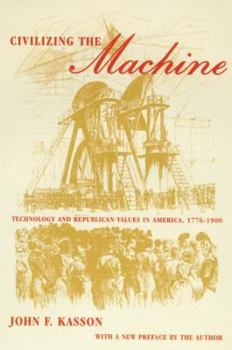Civilizing the Machine: Technology and Republican Values in America, 1776-1900
Select Format
Select Condition 
Book Overview
In Civilizing the Machine , John F. Kasson asks how new technologies have affected this drive for a republican civilization-and the question is as vital now as ever. A major theme of American history has always been the desire to achieve a genuinely republican way of life that values liberty, order, and virtue. Civilizing the Machine was an innovative and compelling work when it first appeared two decades ago: Kasson's analysis of the technical developments...
Format:Paperback
Language:English
ISBN:0809016206
ISBN13:9780809016204
Release Date:May 1999
Publisher:Farrar, Strauss & Giroux-3pl
Length:288 Pages
Weight:0.65 lbs.
Dimensions:0.7" x 5.6" x 8.1"
Customer Reviews
2 ratings
Interesting
Published by Thriftbooks.com User , 23 years ago
We used this book as one of our texts in a history of technology course. I thought that Kasson did an excellent job covering such a large amount of material in a relatively short book.Though it was a little dry (I would never have picked it up on my own) I thought it served as an excellent piece on early American history from a tachnological perspective.
A rather civilized and learned approach...
Published by Thriftbooks.com User , 24 years ago
In "Civilizing the Machine", Kasson presents a very fair and even set of accounts which chronicles the advent of the American industrial and technological communities. While this is not your standard economics or history book, Kasson sets the tone for the burgeoning young nation's entrance onto the world trade stage. His insights over the "hidden agenda" of many early national leaders are quite fascinating; in this regard, he slyly points out that many of our forefathers who were so deftly incline to advocate liberties and freedom for the masses were also deeply concerned over the relatively slight amount of intelligence among the working classes. The book is not without its faults. The decision to not include any narratives about the economic and industrial effects from the Civil War was a troubling omission for this reader. Kassan's treatment of America's infantile arts and education communities might lose some readers. His goal, which takes a while to digest, is to point out that most of the early arts docents from the industrial powerhouses were simply trying to encourage the common workers to realize that their contributions to the "American machine" were actually assisting in the development of a sense of American culture. In that this book takes the reader down the venues of early Revolutionary War era factories, controversial immigration policies in the last half of the nineteenth century, and the mindset behind the first free, public American schools, it is a highly recommended work for fans of history, education in American and the Industrial Revolution.






